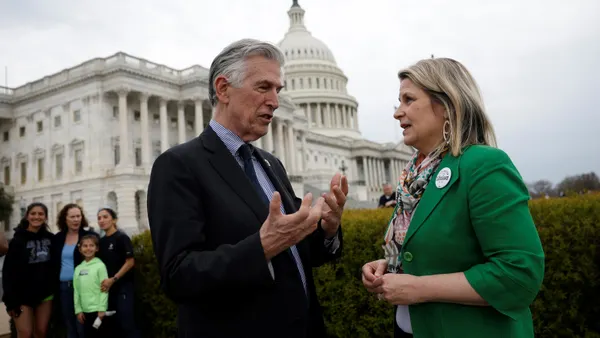Dive Brief:
- Exelon Corp. will close the Three Mile Island plant at the end of September 2019 if Pennsylvania lawmakers do not pass financial support for the 852 MW nuclear generator, the company announced Monday.
- The move comes a week after the plant and another Exelon nuke failed to clear the PJM capacity market auction for the 2020-2021 delivery year. Exelon has indicated it will consider closing the other plant, Quad Cities, if it does not begin to receive subsidies passed in Illinois last year.
- In its closure announcement, Exelon pushed Pennsylvania legislators to integrate nuclear energy into the state's renewable portfolio standard or pass a zero emissions credit (ZEC) program similar to those in New York and Illinois. The company used a similar strategy of threatening plant shutdowns to win approval for subsidies in those states.
Dive Insight:
Thanks to stagnant power demand and cheap natural gas, capacity market prices in latest PJM auction cleared at about $76.50/MW-day for most of the grid, lower than analyst expectations and the $100/MW-day of last year's auction.
That wasn't enough for two Exelon nukes, which have higher fixed costs than modern natural gas plants.
The company says it is committed to keeping Quad Cities online, so long as it starts receiving zero emission credits from the Illinois Future Energy Jobs Act, passed late last year. But Pennsylvania lawmakers have passed no such nuclear support, and Exelon put pressure on them directly in its closure statement.
"Absent policy reforms, the loss of Pennsylvania nuclear plants would increase air pollution, compromise the resiliency of the electric grid, raise energy prices for consumers, eliminate thousands of good-paying local jobs and weaken the state’s economy," company officials wrote.
Exelon wants its nuclear plants included in the state's Alternative Energy Portfolio Standard (AEPS), which directs utilities to source about 18% of their power from resources like wind, solar and hydro by 2020. Either that, or the state could pass a ZEC program like New York or Illinois.
The company used a similar tactic in both of those states to pressure policymakers on nuclear subsidies. Before the Illinois legislature passed its nuclear supports in a last-minute push, Exelon slated a group of plants in the state for closure, threatening major job and tax revenue losses.
The subsidies are controversial, with independent generators arguing they unfairly disadvantage other plants in the market. In March, PJM's independent market monitor, Monitoring Analytics, filed in federal court opposing the Illinois zero emission credits, and the subsidies were a primary focus of a FERC technical conference earlier this month.
Last week, senators grilled two of President Trump's FERC nominees on the subsidies and other energy policies, expressing concern that the federal government may seek to preempt state nuclear supports or other clean energy policies.












